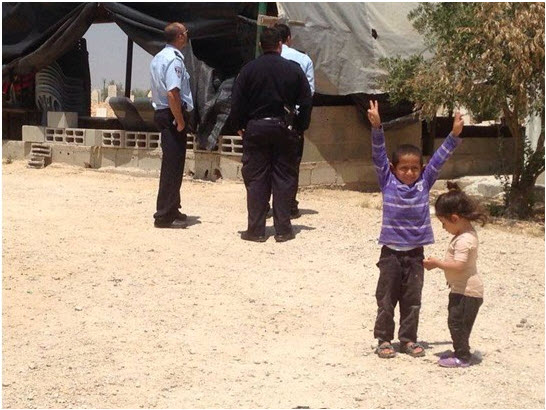In 2014, there was no educational framework for 75% of Bedouin children aged 3-4 in Israel, compared to no more than 5% of Israeli Jewish children without such facilities. This blatant disparity was revealed in a position paper entitled Inequality of Opportunity in Early Childhood Education: The case of 3- and 4-year-old Palestinian Arab children in Israel. The paper, which was authored by Attorneys Muna Haddad and Sawsan Zaher from Adalah, was published last week by the NGO on International Day for the Protection of the Child (June 1), and is based on data compiled by Adalah from several official sources.

Arab-Bedouin children in Al-Araqib, an unrecognized village in the Negev (Photo: Forum for Coexistence in the Negev)
The main reason for this huge gap, according to the position paper, is an acute shortage of kindergartens and transportation services to existing kindergartens.
During the last few months, prior to publishing the paper, Adalah sent a number of letters to the Education Ministry demanding a detailed program to secure kindergarten education in the Arab-Bedouin villages in the Negev, but the Ministry did not respond.
Israel’s Compulsory Education Law requires that the state provide compulsory education for 3-4 year olds. However, since the passage 30 years ago of amendments which lowered the compulsory age from 5 to 3-4 years of age, there has been sparse implementation. The law is due to go fully into effect during the 2015-2016 school year.
The position paper notes that in his 2015 report, the State Comptroller emphasized that the Education Ministry approves only a small percentage of requests by Arab local authorities to open kindergartens in Arab towns and villages. For example, the government-planned Arab Bedouin town of Hura requested the opening of 13 kindergartens from 2012-2014, however, the Ministry of Education approved only 4 of them. The numbers in this case merely reflect a much graver and widespread phenomenon: According to a report issued by the Al-Tufula early childhood center in Nazareth, more than 1,050 kindergartens are needed in Palestinian Arab towns and villages throughout Israel.
The State Comptroller’s report highlights another disparity: Israeli Jewish children receive 35 hours a week of kindergarten education, while Arab children receive only 30 hours. Moreover, Jewish pupils are allocated at least 16% more money per child by the Education Ministry than Arab children: For each Jewish child 807 Shekels are budgeted, while the sum allotted for Arab children is only 693 Shekels.
Adalah Attorney Muna Haddad emphasized: “The research proves the existence of a problem of the utmost importance to early childhood growth and development. While the Compulsory Education Law will take effect during the next school year for children aged 3 years-old and above, the Education Ministry has not provided any appropriate solutions for the Arab towns.” Attorney Haddad added: “The Ministry of Education must take responsibility and introduce measures to reduce the gaps between the Israeli Jewish and Arab children, including the opening of schools, the equal allocation of certain resources, and the allocation of “affirmative action” budgets which are commensurate with the difficult circumstances faced by the Arab education system. Furthermore, the Education Ministry must ensure the enrollment of Bedouin children from age 3 in kindergartens, in accordance with the law.”


